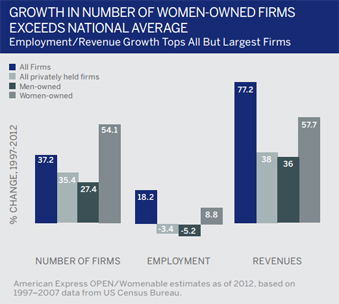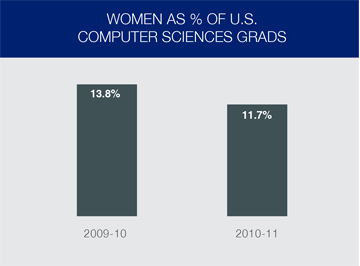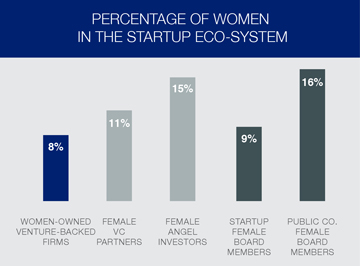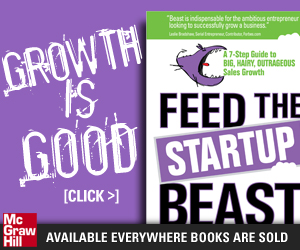Where Are All the Women Entrepreneurs?
Building a business is never easy, but do women entrepreneurs have an extra hurdle to overcome?
By now, nearly everyone with a pulse knows the names Richard Branson, Steve Jobs, Mark Zuckerberg, Larry Page, Sergey Brin and Bill Gates. They’re not just entrepreneurs, they’re rock stars. They started their startups from the ground up, and out of their sandcastle dreams they managed to build an empire or two. But what about their female counterparts? Where are all the female rock stars?
Actually, they’re everywhere.
From Silicon Valley to Sydney; from Bahrain to Brazil; from Manchester to Mumbai and everywhere in between, women entrepreneurs have been starting and building multi-million dollar companies and doing so at a faster rate than men over the past decade. Currently, there are more than 8.6 million women-owned businesses in the United States alone, generating over $1.3 trillion in revenue. So why does the public know so little about them? And why, in spite of this rapid growth, are there still so many more male-run than female-run startups?
The answers are complex, so I turned to someone in a great position to help me understand. Andrea Guendelman is a cross-border financing lawyer based in Boulder, Colorado. But more importantly, she’s connected to thousands of women entrepreneurs from all over the world. Just a year ago, she co-created and produced Common Pitch Chile, the biggest innovation and entrepreneurship event ever held in South America.  It attracted 10,000 participants and featured Al Gore as keynote speaker. This year she co-produced Boulder, Co.-based Startup Phenomenon Women with her partner Carrie Van Heyst, the first in a series of networking events designed to inform, encourage and inspire entrepreneur women. Over 600 high powered entrepreneurs attended.
It attracted 10,000 participants and featured Al Gore as keynote speaker. This year she co-produced Boulder, Co.-based Startup Phenomenon Women with her partner Carrie Van Heyst, the first in a series of networking events designed to inform, encourage and inspire entrepreneur women. Over 600 high powered entrepreneurs attended.
Women are not going into computer sciences
Andrea says one of the reasons there are so few female tech entrepreneurs is that “women are not going into the sciences and math – the tech world.” Of the 120,000 computer-science graduates in the U.S. each year, only 11 per cent are women – and the numbers are declining. Another reason for the dearth of female tech entrepreneurs is limited access to capital. Most venture capitalists want to invest in high growth startups – companies that can quickly scale. But women tend to be underrepresented in those kinds of companies.
Andrea also points out that women’s “selling skills need improving.” In her experience, women entrepreneurs tend to lack the confidence and “bravado” that male entrepreneurs have (some might call it chutzpah), and that can hurt them when it comes to attracting funding. They also tend to be perfectionists and sometimes need to get all their ducks in a row before plunging ahead with the business. But businesses are never perfect, and neither is timing.
Women entrepreneurs have exceptional networking and leadership skills
That said, women entrepreneurs have tremendous untapped strengths in other areas. For example, Andrea notes that women are exceptionally good at building effective ecosystems and nurturing communities. In fact, women tend to have more advanced networking, leadership and nurturing skills – three of the reasons why Andrea continues to champion their cause so passionately.
To broaden my perspective, Andrea suggested I talk to some of the women in her business network. One of the first women I talked to was Fran Maier, the dynamic cofounder of Match.com, the world’s first online dating service. Fran left Match.com in 1998 and went on to join TRUSTe (pronounced “trustee”), transforming it from a non-profit to a very successful for-profit, venture-backed company. TRUSTe has become one of the world’s leading Data Privacy Management companies, and Fran now serves as its board Chair. Fran is not only a successful serial entrepreneur, she’s currently mentoring half a dozen female startups (and some male startups as well).
Women dominate social media
“Networking used to be a male preserve,” says Fran, “but the Internet has changed everything. Women already dominate many of the big social media networks such as Twitter and Facebook, and they’re taking advantage of the ‘social web’ to build their business networks”. On the down side, she notes that the Venture Capital world is predominantly male, and men tend to relate better to male entrepreneurs. When women present their business case, VCs often say “I don’t get it.” They’ve even been known to “not get it” when the business has customers and revenue and is cash flow positive!
Only 8 per cent of venture backed companies are women-owned. Only 11 per cent of venture capital partners are female. Only 15 per cent of angel investors are female. And only 9 per cent of board members are female, which is even lower than the already low percentage of women on public boards (16 per cent).
Fran certainly doesn’t feel all the blame for these numbers can be laid at the feet of outsiders. Some of the barriers are self-inflicted. For example, women entrepreneurs tend not to be as aggressive and persistent as they could be, and they are hesitant to jump in and “make the deal” the way men often do. Fran also agrees with Andrea that there simply aren’t enough women going into the sciences – specifically engineering. Unfortunately, the lack of women software “geeks” tends to reinforce a stereotype in the minds of many funders who unconsciously favour the unshaven young male techno-nerd in a hoodie over the well-dressed female with a credible plan and the motivation to carry it out.
Fran’s message: target women and the products they buy
Yet, some of the world’s greatest entrepreneurs have come from sales and marketing, so there’s no need for women to be discouraged if they don’t have techie credentials. Fran’s key message to women entrepreneurs is this: target women’s products and the women who buy them “because they’re just like you. It’s a huge market – women represent nearly three quarters of all purchasing power.” At the same time, women consumers often feel misunderstood by the merchants they buy from. This is the classic “unmet need” that so many marketing case studies showcase. As Fran said in a recent keynote address she gave at a Women 2.0 conference: “The women you’re targeting are very much YOU. Go out and get her!”
As a result of my talks with Andrea and Fran, three big questions remain:
- One: Do women think “big” enough?
- Two: Where are the female VCs?
- Three: What concrete steps can women entrepreneurs take to get on an even footing with men?
Let us know your thoughts in the comment section below, and stay tuned for Part 2 because fast-rising entrepreneurs Sara Sutton Fell (FlexJobs.com), Kelly Hoey (Women Innovate Mobile) and Meena Mansharamani (GoGo squeeZ, Pup to Go) will provide some intriguing answers.
For part 2 of this post, “An Action Plan for Women Entrepreneurs”, please click here.
About Jonathan Verney
I’m Jonathan Verney. I’m a lucky man because I get to write for a living, but also because I have the opportunity to work with Drew to help entrepreneurs grow their businesses.









Recent Comments